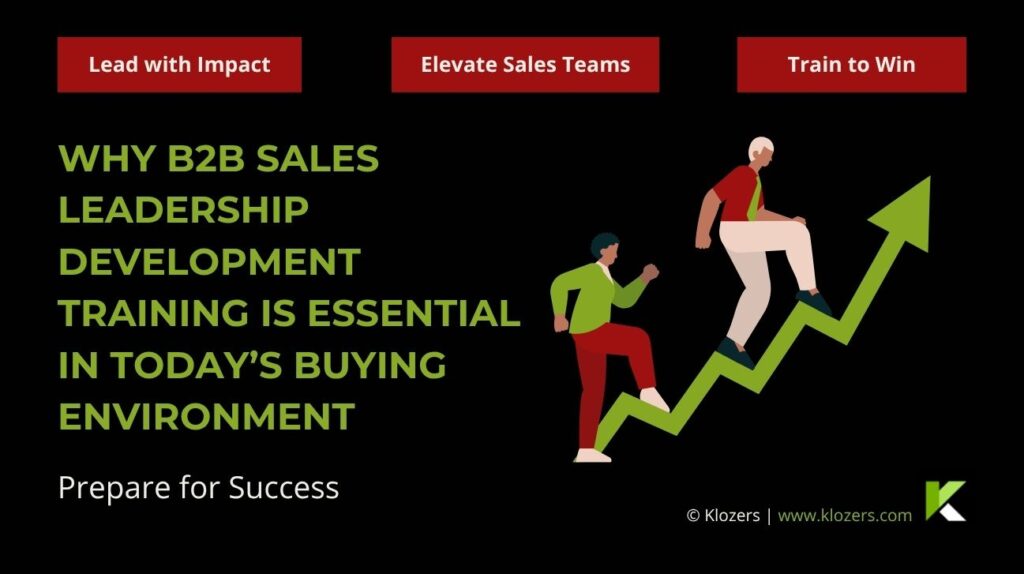B2B Sales Leadership Development Training - Top Question From Google:
What does B2B sales leadership development training entail?
B2B sales leadership development training equips sales leaders and managers with the skills and knowledge they need to successfully manage sales teams within the context of business-to-business selling. It teaches skills like strategic thinking, sales planning, coaching, and performance management, among others.
Free access to our best tools and templates
Introduction: B2B sales leadership development training
B2B selling is not as straightforward as it used to be, as buyers no longer rely on salespeople for information. Instead, they do their research and compare options before making a decision. Deals often involve multiple decision-makers and high expectations, with each buyer wanting a personalised experience. They also want to feel confident that the product or service will solve their problems and deliver value.
To be successful, B2B sales managers have a big role to play. They guide their teams, make strategic decisions, and ensure that every rep understands the buyer’s needs. Without skilled leadership, sales teams can become disorganised and lose deals. That’s why leadership training designed for B2B sales is no longer optional. It’s a must-have.
Core Competencies Built Through B2B Sales Leadership Development Training
Strategic thinking
Strategic thinking is integral to effective B2B sales leadership. Sales leaders need to see beyond individual deals and understand how their team’s efforts fit into the bigger business picture. This means learning to analyze market trends, identify new opportunities, and make decisions that help the company grow over time. They also develop skills in resource allocation, helping them decide where to invest time and energy for the best results.
Strategic thinking training teaches leaders how to balance short-term sales targets with long-term relationship building. This is especially important in B2B sales, where customer relationships can last for years and generate significant recurring revenue. Leaders learn to think about customer lifetime value, not just immediate sales numbers.
Coaching and mentoring sales reps
One of the most important jobs of a B2B sales leader is developing their team members. Good coaching can turn average performers into top sellers, while poor coaching can cause talented reps to leave or underperform. Training programs teach leaders how to identify each rep’s strengths and weaknesses, then provide support to help them improve. They also discover how to recognize when team members need different types of support, whether that’s skill development, motivation, or help with specific challenges. Sales leaders learn to create environments where reps feel comfortable sharing their struggles and asking for help. This builds trust and makes the whole team more effective.
Data-driven decision making
B2B sales leadership development training programs teach sales managers how to use sales data to make better decisions about everything. Leaders learn to spot trends in their data that can help predict future sales performance and identify potential problems before they become serious. Forecasting accuracy is important for B2B companies because it affects inventory planning, resource allocation, and investor confidence. Training helps leaders understand different forecasting methods and choose the right approach for their business. They learn to combine hard data with insights from their team to create realistic predictions. Data-driven leadership also means knowing which metrics matter most. This helps them take action to improve performance before problems show up in the final sales numbers.
Leading with emotional intelligence
Recent research shows that emotional intelligence is responsible for 58% of professional success, with the World Economic Forum ranking it as one of the most important skills needed by 2025. In B2B sales, where relationships are everything, emotional intelligence becomes even more important for leaders.
Training programs teach leaders how to recognize and manage their own emotions, especially during stressful situations like missed targets or difficult customer negotiations. They also learn to read the emotions of their team members and customers, helping them respond appropriately to different situations. They discover how to have difficult conversations without damaging relationships and how to motivate team members who are struggling.
Sales managers also learn how to enhance cross-functional collaboration. They learn to work effectively with marketing, customer service, product development, and other teams. This requires understanding different perspectives and finding ways to align everyone around common goals.
Adapting to tech
Technology changes quickly, and B2B sales leaders need to stay current with new tools and platforms. Training programs help leaders understand how to evaluate new technologies and decide which ones will actually help their teams sell more effectively. They learn to avoid getting caught up in every new trend while still embracing innovations that provide real value.
Modern training also teaches how to leverage trends like AI, automation, and personalization to make sales processes more efficient. Leaders discover how to use customer relationship management systems, sales analytics tools, and communication platforms to support their teams better.
The Effect: How Better Leadership Elevates Sales Teams
When B2B sales leaders receive proper training, the positive effects ripple through their entire organization. Teams with well-trained leaders consistently outperform those with untrained managers, often by significant margins. This happens because good leadership creates a cycle of improvement that benefits everyone involved.
Better leadership leads to improved team morale and lower turnover rates. Sales reps want to work for managers who support their growth and help them succeed. When leaders know how to coach effectively and provide meaningful feedback, their team members feel more valued and engaged. This reduces the costs and disruption associated with hiring and training new reps.
Research found that salespeople with high emotional intelligence receive more customer referrals than those with lower emotional intelligence levels. When leaders model and encourage emotional intelligence, it spreads throughout the team and improves customer relationships. This leads to more repeat business and referrals, which are often the most profitable types of sales.
Well-trained leaders also make better strategic decisions that improve long-term performance. They allocate resources more effectively, identify opportunities faster, and help their companies avoid costly mistakes. Their teams become more adaptable and resilient, better able to handle changes in the market or competitive landscape.
Customer satisfaction improves when sales teams are led by trained professionals. These leaders ensure their reps understand customer needs and deliver solutions that actually work. They create processes that make it easier for customers to buy and get the support they need after the sale. This leads to stronger relationships and more predictable revenue growth.
Actionable Tip
Integrate coaching and data-driven decision-making into leadership training to boost team performance and retention.
Final Thoughts
Strong leadership is the difference between an average sales team and a high-performing one. B2B sales leadership development training builds the strategic thinking, coaching ability, emotional intelligence, and tech adaptability today’s environment demands. When leaders are well equipped, teams thrive, customers receive better experiences, and businesses see sustainable growth. Investing in leadership training isn’t optional, it’s a strategic necessity.






